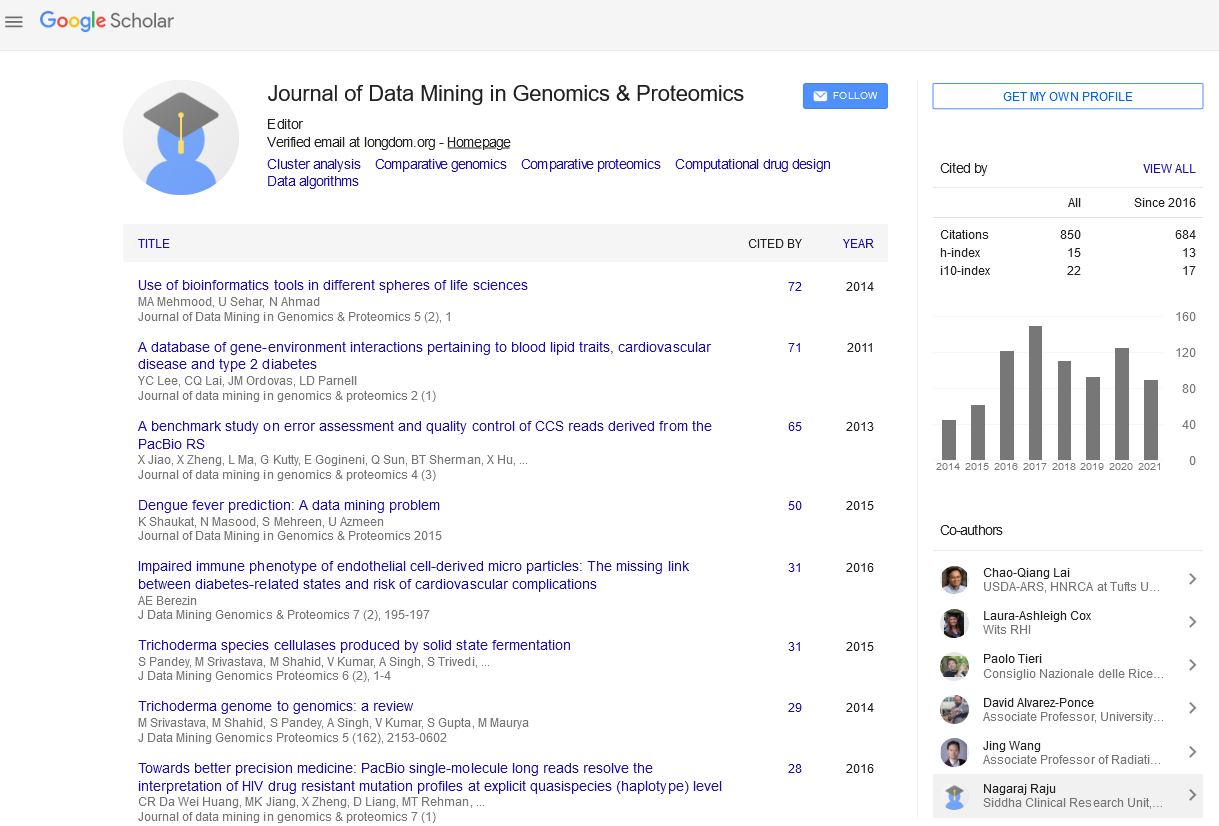PMC/PubMed Indexed Articles
Indexed In
- Academic Journals Database
- Open J Gate
- Genamics JournalSeek
- JournalTOCs
- ResearchBible
- Ulrich's Periodicals Directory
- Electronic Journals Library
- RefSeek
- Hamdard University
- EBSCO A-Z
- OCLC- WorldCat
- Scholarsteer
- SWB online catalog
- Virtual Library of Biology (vifabio)
- Publons
- MIAR
- Geneva Foundation for Medical Education and Research
- Euro Pub
- Google Scholar
Useful Links
Share This Page
Journal Flyer

Open Access Journals
- Agri and Aquaculture
- Biochemistry
- Bioinformatics & Systems Biology
- Business & Management
- Chemistry
- Clinical Sciences
- Engineering
- Food & Nutrition
- General Science
- Genetics & Molecular Biology
- Immunology & Microbiology
- Medical Sciences
- Neuroscience & Psychology
- Nursing & Health Care
- Pharmaceutical Sciences
Pharmacogenomics of AML: A road towards personalized medicine
2nd International Conference on Big Data Analysis and Data Mining
November 30-December 01, 2015 San Antonio, USA
Jatinder Lamba
University of Minnesota, USA
Posters-Accepted Abstracts: J Data Mining Genomics Proteomics
Abstract:
Acute myeloid leukemia (AML) is the second most common form of childhood leukemia and has the worst prognosis of all major childhood cancers. Improving the treatment outcome for patients with AML remains a major clinical challenge. The nucleoside analog, cytarabine (ara-C), has been the mainstay of AML chemotherapy for more than 40 years. However, wide inter-patient variation in treatment response, development of resistance, and severe toxicity remain as major hurdles to effective ara-C chemotherapy. Ara-C is a prodrug that requires activation to ara-CTP by multiple phosphorylation steps. Incorporation of ara-CTP in place of dCTP results in chain termination, thereby blocking DNA and RNA synthesis and causing leukemic cell death. Thus, cellular pathways involved in ara-CTP formation and metabolism as well as in ara-CTP mediated cell death are likely to be significant determinants of ara-C treatment response. Inter-patient variation in relevant pharmacokinetic (PK) and pharmacodynamic (PD) genes may impact the clinical response and toxicity among patients receiving ara-C. We have evaluated genes of importance in ara-C chemotherapy and have found that genetic variation in the ara-C pathway genes had similar prognostic relevance as the well-established factors listed above. We will share our results on ara-C pharmcogenomics and its impact on clinical outcome in AM. Overall our results indicate that understanding of genetic variation in key ara-C metabolic pathway genes might be clinically relevant by providing additional explanation of the variability in clinical response beyond known prognostic factors and might have the potential of being additional prognostic markers of clinical outcome.
Biography :
Jatinder Lamba has completed her Ph.D. in 2000 at Post Graduate Institute of Medical Education and Research in India and did postdoctoral training at St.Jude Children’s Research Hospital in the field of Pharmacogenomics. She is currently Associate Professor and Director of PUMA-Institute of Personalized Medicine at University of Minnesota. Her research focuses on Pharmacogenomics of anticancer drugs. She has published more than 60 manuscripts in journals of national/international repute. Her Research is funded through National Institutes of Health, National Cancer Institute and through Minnesota State partnership.


